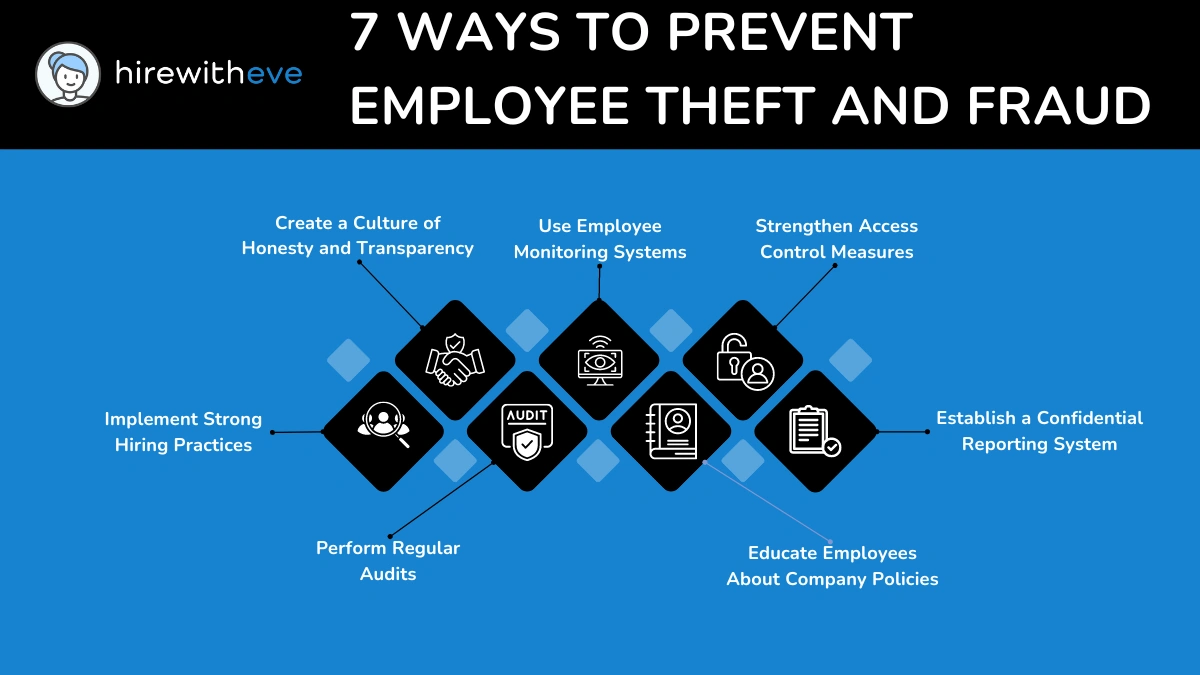7 Ways to Prevent Employee Theft and Fraud
7 Ways to Prevent Employee Theft and Fraud

Employee theft and fraud are growing concerns for businesses of all sizes. From financial discrepancies to stolen assets, such activities can severely impact an organization’s bottom line. To protect their company and foster a culture of integrity, HR managers and talent acquisition specialists need to implement effective measures.
Employee theft and fraud can have a significant financial and reputational impact on businesses. Whether through stolen goods, financial fraud, or intellectual property theft, the consequences can be devastating.
For talent acquisition specialists and HR managers, understanding how to prevent employee theft is not only crucial for maintaining workplace integrity but also for building a trustworthy team. Implementing preventative measures can help businesses safeguard against these risks while creating a culture of accountability.
In this blog, we’ll explore seven effective ways how to prevent employee theft and fraud in the workplace.
Table of contents
Why Do Employees Steal?
Understanding why employees engage in theft or fraud is essential in learning how to prevent employee theft.
While each case may vary, several common reasons can drive otherwise honest employees to steal:
Financial Pressure: Personal financial struggles, such as debt or unexpected expenses, can push employees to steal money, goods, or company resources. When an employee feels financially strained, the temptation to take advantage of easy access to company assets increases.
Opportunity: A lack of security measures or internal controls creates an environment where theft becomes more accessible. If employees believe they won’t be caught, or that their actions will go unnoticed, the likelihood of theft increases. This is why implementing robust monitoring systems is critical when thinking about how to prevent employee theft.
Perceived Injustice: Employees who feel undervalued, underpaid, or mistreated are more likely to justify theft as a form of compensation or revenge. They may feel the company “owes” them for their perceived grievances, and stealing becomes a way to balance that perceived inequality.
Workplace Culture: In environments where theft or unethical behavior is tolerated or overlooked, employees may feel emboldened to engage in similar actions. A workplace culture that lacks accountability or where theft is normalized can lead to widespread fraud.
Lack of Ethical Boundaries: Some employees simply lack strong ethical standards, making them more prone to dishonest behavior. If they have not received adequate training or guidance on ethical practices, they might not fully understand the gravity of their actions or the consequences they could face.
By addressing these underlying causes, HR professionals and business leaders can take proactive steps in how to prevent employee theft by targeting the root of the problem before it escalates.
The 7 Ways to Prevent Employee Theft and Fraud

Implement Strong Hiring Practices
The first step in how to prevent employee theft starts with hiring the right people. Thorough background checks and reference verifications are essential in ensuring that potential hires have a clean record and do not have a history of fraudulent behavior. Behavioral interviews, psychometric tests, and skills assessments can also provide insights into a candidate's honesty and reliability.
According to a survey by the Association of Certified Fraud Examiners, organizations lose an estimated 5% of their revenue to fraud every year. A robust hiring process can significantly reduce the likelihood of recruiting individuals with dishonest intentions.
How to prevent employee theft through hiring practices? By integrating comprehensive checks into your recruitment strategy, you can identify red flags early on. While it’s impossible to guarantee every hire will be trustworthy, reducing risks at this stage is essential to preventing theft and fraud.
Create a Culture of Honesty and Transparency
Another vital aspect of how to prevent employee theft is fostering an organizational culture rooted in honesty and transparency. When employees feel valued and respected, they are less likely to engage in dishonest behavior. Leadership must lead by example — managers should demonstrate ethical behavior and emphasize the importance of integrity.
A transparent workplace, where communication is open, and employees are encouraged to voice concerns, can help eliminate any temptations to steal. When there are clear expectations regarding behavior, employees are more inclined to uphold these standards.
Perform Regular Audits
One of the more practical ways of how to prevent employee theft is by conducting regular audits. Financial audits, inventory checks, and thorough reviews of business processes can help detect discrepancies early on. Fraudulent activities can sometimes go unnoticed for years, leading to significant financial losses. Regularly scheduled and unscheduled audits are effective in maintaining accountability and ensuring that any abnormalities are swiftly addressed.
By implementing both internal and external audits, organizations can gain valuable insights into potential vulnerabilities within their system. Audits also serve as a deterrent to employees who may consider dishonest activities, knowing that their actions are being monitored.
Use Employee Monitoring Systems
In today’s digital age, using technology to monitor employees is a powerful method of how to prevent employee theft and fraud. Many companies have implemented employee monitoring systems, such as video surveillance and software that tracks digital activity. These systems can monitor areas where theft is more likely to occur, such as cash registers, storage rooms, or inventory systems.
When employees are aware that their activities are being monitored, they are less likely to engage in fraudulent behavior. However, it’s essential to strike a balance between monitoring for security and respecting employees’ privacy. Organizations should be transparent about their monitoring policies to ensure employees understand that these measures are in place to protect the company and its employees.
Educate Employees About Company Policies
A well-informed workforce is crucial in preventing internal fraud. Regular training on company policies and ethical standards is a proactive approach to how to prevent employee theft. Employees should be made aware of the consequences of theft and fraud, both for the company and for themselves.
Training sessions should include clear examples of unacceptable behavior and outline the company's procedures for handling such incidents. When employees are educated on the impact of theft and fraud, they become more vigilant and more likely to report suspicious activities.
Strengthen Access Control Measures
Limiting access to sensitive areas or information is another key component in how to prevent employee theft. Organizations should have access control systems in place, such as keycards, password-protected files, or biometric systems, to ensure that only authorized personnel can access valuable or confidential materials.
For example, inventory systems, cash registers, or financial records should be accessible only to those whose job responsibilities require it. Restricting access minimizes the chances of theft and helps hold individuals accountable for any discrepancies in their assigned areas.
Establish a Confidential Reporting System
One of the most effective ways to identify and stop fraudulent activities is by implementing a confidential reporting or whistleblower system. This allows employees to report theft or fraud without fear of retaliation, encouraging a culture of accountability. The anonymity provided by such systems helps create a safe environment for reporting unethical behavior.
Having a confidential reporting system in place is crucial for HR managers looking for practical steps on how to prevent employee theft. Employees are more likely to report misconduct when they know they can do so safely and discreetly.
Conclusion
In conclusion, understanding how to prevent employee theft and fraud is essential for protecting a company’s resources and maintaining a culture of trust. By implementing strong hiring practices, fostering transparency, performing regular audits, using monitoring systems, educating employees, strengthening access control, and establishing a confidential reporting system, businesses can minimize the risks of internal theft and fraud.
For HR managers and talent acquisition specialists looking for a streamlined solution to optimize these processes, HirewithEve offers comprehensive tools that align with many of these preventative strategies. The platform’s skills-based assessments, data analytics, and insights can help ensure that trustworthy candidates are selected from the start.
Additionally, HirewithEve provides tools for tracking and monitoring employee performance, which can be an invaluable asset in creating a fraud-resistant culture.
By leveraging technology and best practices, companies can stay one step ahead of potential threats, creating a safer and more transparent workplace.
Target Your Talent
Unlock tailored solutions for your recruitment and hiring needs with Eve Platform's extensive case study library.
Subscribe now to enhance your HR expertise and excel in your role.
Free Resources

Transforming Hiring: 7 Key Recruiting Metrics
Enhancing recruitment processes with data-driven insights for better hiring outcomes.

Reducing Hiring Bias with Hirewitheve.
Utilizing Hirewitheve to combat bias and streamline recruitment processes effectively.

Hiring Detail-Oriented Candidates
HirewithEve enhances hiring by accurately assessing candidate's attention to detail-oriented.
